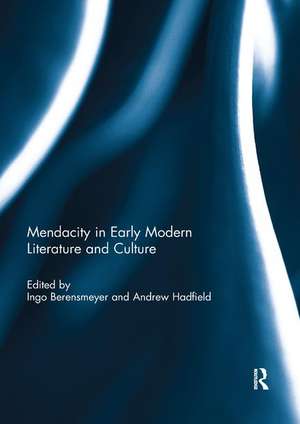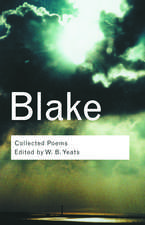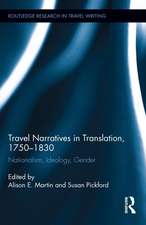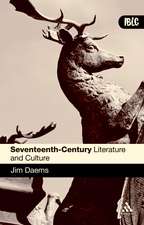Mendacity in Early Modern Literature and Culture
Editat de Ingo Berensmeyer, Andrew Hadfielden Limba Engleză Paperback – 3 ian 2019
| Toate formatele și edițiile | Preț | Express |
|---|---|---|
| Paperback (1) | 416.22 lei 6-8 săpt. | |
| Taylor & Francis – 3 ian 2019 | 416.22 lei 6-8 săpt. | |
| Hardback (1) | 997.90 lei 6-8 săpt. | |
| Taylor & Francis – 18 apr 2016 | 997.90 lei 6-8 săpt. |
Preț: 416.22 lei
Nou
Puncte Express: 624
Preț estimativ în valută:
79.64€ • 83.45$ • 65.84£
79.64€ • 83.45$ • 65.84£
Carte tipărită la comandă
Livrare economică 12-26 aprilie
Preluare comenzi: 021 569.72.76
Specificații
ISBN-13: 9781138391802
ISBN-10: 1138391808
Pagini: 120
Dimensiuni: 174 x 246 x 6 mm
Greutate: 0.45 kg
Ediția:1
Editura: Taylor & Francis
Colecția Routledge
Locul publicării:Oxford, United Kingdom
ISBN-10: 1138391808
Pagini: 120
Dimensiuni: 174 x 246 x 6 mm
Greutate: 0.45 kg
Ediția:1
Editura: Taylor & Francis
Colecția Routledge
Locul publicării:Oxford, United Kingdom
Public țintă
Postgraduate and UndergraduateCuprins
Introduction: Mendacity in Early Modern Literature and Culture 1. Hiding the Peacock’s Legs: Rhetoric, Cosmetics and Deception in Shakespeare’s Lucrece and Trussell’s Hellen 2. Mendacity and Kingship in Shakespeare’s Henry V and Richard III 3. ‘An Anxious Entangling and Perplexing of Consciences’: John Donne and Catholic Recusant Mendacity 4. Truth and Lying in Early Modern Travel Narratives: Coryat’s Crudities, Lithgow’s Totall Discourse and Generic Change 5. ‘Betrayed My Credulous Innocence’: Mendacity and Female Education in John Milton and the ‘Battle of the Sexes’ 6. Lying, Language and Intention: Reflections on Swift
Notă biografică
Ingo Berensmeyer is Professor of English and American Literature at Justus Liebig University, Giessen, Germany, and Visiting Professor of English Literature and Culture at Ghent University, Belgium. His research interests range from Shakespeare to contemporary literature. His most recent publications are 'Angles of Contingency': Literarische Kultur im England des siebzehnten Jahrhunderts (2007); study guides to Shakespeare's Hamlet (2007) and to Literary Theory (2009) and the co-edited book Perspectives on Mobility (with Christoph Ehland, 2013).
Andrew Hadfield is Professor of English at the University of Sussex, Brighton, UK, and Visiting Professor at the University of Granada, Spain. He is the author of a number of works on early modern literature, including Edmund Spenser: A Life (2012), Shakespeare and Republicanism (2005), and Literature, Travel and Colonialism in the English Renaissance, 1540-1625 (1998). He is vice-chair of the Society for Renaissance Studies and is currently writing a book on lying in early modern England.
Andrew Hadfield is Professor of English at the University of Sussex, Brighton, UK, and Visiting Professor at the University of Granada, Spain. He is the author of a number of works on early modern literature, including Edmund Spenser: A Life (2012), Shakespeare and Republicanism (2005), and Literature, Travel and Colonialism in the English Renaissance, 1540-1625 (1998). He is vice-chair of the Society for Renaissance Studies and is currently writing a book on lying in early modern England.
Descriere
Mendacity in Early Modern Literature and Culture examines the historical, cultural and epistemological underpinnings of lying and deception in early modern England (1500-1750). The book draws on a wide range of English literature from Shakespeare to Swift, and from travel writing to poetry, in order to explore the extent to which plays, poems and narrative texts were sites of negotiation and, at times, of ideological warfare between the moral imperative of truth-telling and the expediency of telling lies. This book was originally published as a special issue of the European Journal of English Studies.
















